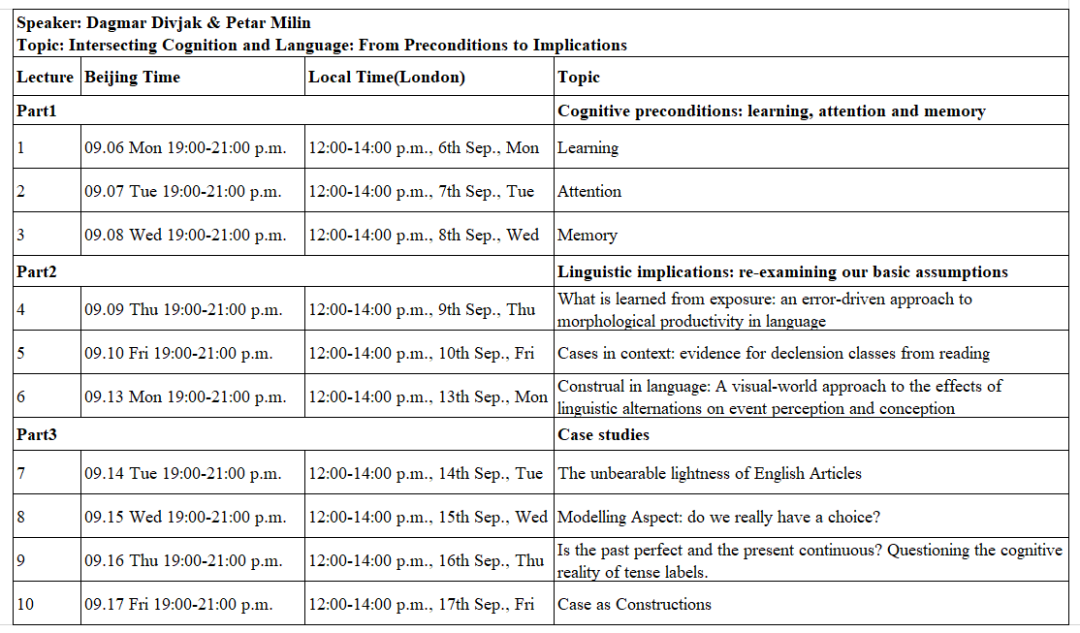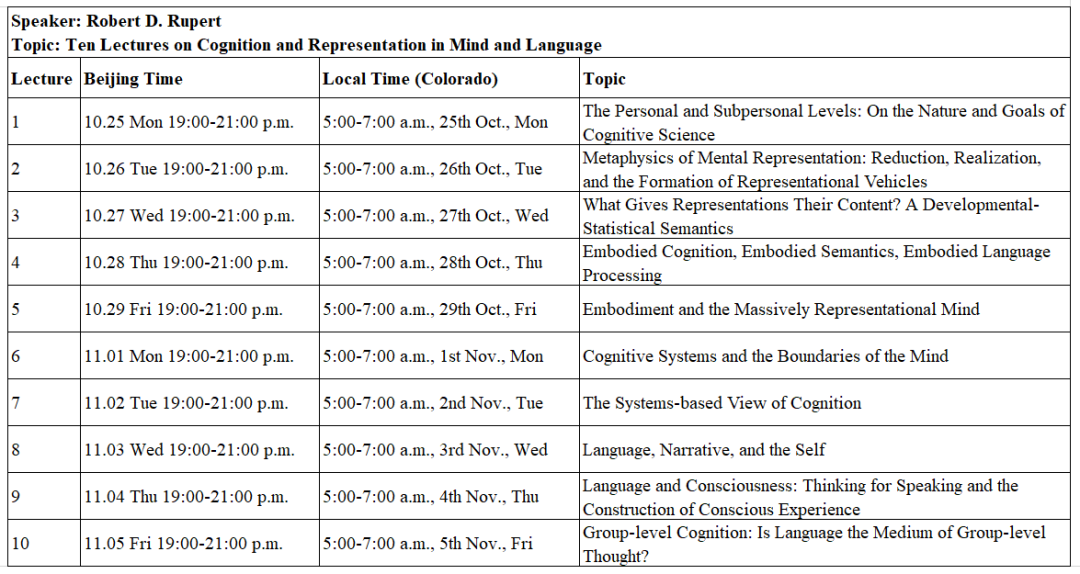429 阅读 2021-03-02 09:16:04 上传
以下文章来源于 语言学札记
01
About CIFCL
China International Forum on Cognitive Linguistics (CIFCL) is an annual event featuring on the “Ten Lecture Series” by the invited keynote speakers as well as on the presentations by the participants. It is an international conference in combination with intensive training courses in particular fields in CL. This forum is centered on CL, but also pays close attention to the development of other disciplines in cognitive science. The forum hosts the latest theories and data from the world’s best cognitive scientists with a special focus on language and cognition from disciplines including linguistics, psychology, philosophy, anthropology, artificial intelligence, computer science, and education. Each year, in addition to the core of the forum, that is, the forum speakers’ “Ten Lecture Series”, the general participants are invited to submit papers within the whole range of cognitive science. The organizers endeavor to satisfy the general demand from the largest possible research population for latest theories, and for direct communication with the original scholars.
CIFCL provides a forum for eminent international scholars to give lectures on their original contributions to the field of cognitive linguistics. It is a continuing program organized by several prestigious universities in Beijing. The text is published, accompanied by its audio disc counterpart, as one of the Distinguished Lectures in Cognitive Linguistics (DLCL).
02
Keynote Speakers and Schedules for CIFCL-20 and CIFCL-21
CIFCL-20
1、Elizabeth C. Traugott (10th-21st May, 2021)

Professor Emerita of Linguistics and English (Ph.D., University of California at Berkeley, 1964) Traugott has done research in historical syntax, semantics, and pragmatics, lexicalization, socio-historical linguistics, and linguistics and literature. Her current research focuses on i) ways to bring the theories of construction grammar, grammaticalization and lexicalization together in a unified theory of constructionalization, ii) the development of pragmatic markers at left and right periphery of the clause and on ways to define “periphery”. Publications include A History of English Syntax (1972), Linguistics for Students of Literature (1980; with Mary L. Pratt), On Conditionals (1986; co-edited with Alice ter Meulen, Judith Snitzer Reilly, and Charles A. Ferguson), Approaches to Grammaticalization (1991; co-edited with Bernd Heine, 2 volumes), Grammaticalization (1993, 2nd much revised ed. 2003; with Paul Hopper), Regularity in Semantic Change (2002; with Richard B. Dasher), Lexicalization and Language Change (2005; with Laurel J. Brinton), Gradience, Gradualness and Grammaticalization (2010; co-edited with Graeme Trousdale), The Oxford Handbook of the History of English (2012; co-edited with Terttu Nevalainen), and Constructionalization and Constructional Changes (2013; with Graeme Trousdale).

2、Dagmar Divjak & Petar Milin(6th-17th Sep, 2021)

Dagmar Divjak is a Professorial Research Fellow at the University of Birmingham where she holds a Chair in Cognitive Linguistics and Language Cognition. She is Editor-in-Chief of the journal Cognitive Linguistics and has co-edited De Gruyter’s Handbook of Cognitive Linguistics. Her main research interests are in understanding the relation between our general and individual cognitive abilities and the patterns and structures we see in language. She has worked extensively on charting what language has to offer the learner in their quest for the meaning of words and constructions and her first monograph Clustering the Lexicon was published in the series Cognitive Linguistics Research.Currently, she is working on putting usage-based theories on a cognitively sounder footing by exploring which distributional patterns learners discover in data, given existing constraints on memory and attention. A monograph on this topic “Frequency in Language: Memory, Attention and Learning” is forthcoming with Cambridge University Press.

Dr. Petar Milin is a psychologist who has published extensively in the domain of language learning and language processing. He co-leads on a ₤1M grant that aims to a step-change in understanding language and, in particular, language learning. As one of the principal developers of the Naive Discrimination Learning framework, he is experienced in advanced statistical and the computational modelling of language.

CIFCL-21
1、Michael Barlow (11st-22nd Oct, 2021)

Michael Barlow received his PhD in Linguistics from Stanford University. He is currently Associate Professor in Applied Language Studies at the University of Auckland in New Zealand. Dr. Barlow has written books and articles broadly based on usage-based approaches to language and his research relies on corpus analysis to understand the nature of grammatical patterning and the relation of that patterning to cognitive representations. He has created several text analysis programs including concordancers MonoConc and ParaConc and a collocation extraction program, Collocate. A recently developed program, WordSkew, is designed to apply corpus analysis techniques while at the same time taking note of the structure of texts.

2、Robert D. Rupert (25th Oct-5th Nov, 2021)

Robert D. Rupert is Professor of Philosophy at the University of Colorado at Boulder, a fellow of UC-Boulder’s Institute of Cognitive Science, and a core faculty member of UC-Boulder's Committee for the History and Philosophy of Science. He has published on various topics in philosophy of cognitive science, philosophy of mind, philosophy of science, metaphysics, epistemology, and philosophy of language. His most influential works address questions concerning situated cognition (“Challenges to the Hypothesis of Extended Mind,” Journal of Philosophy, 2004; Cognitive Systems and the Extended Mind, Oxford University Press, 2009), group minds (“Minding One's Cognitive Systems: When Does a Group of Minds Constitute a Single Cognitive Unit?”), and mental representation (“The Best Test Theory of Extension: First Principle(s),” Mind & Language1999; “Coining Terms in the Language of Thought,” Journal of Philosophy, 2001; “Representation and Mental Representation,” Philosophical Explorations, 2018). He is Regular Visiting Professor at University of Edinburgh and was previously Professorial Fellow there. He has also held visiting positions at the Australian National University, Ruhr-Universität Bochum, New York University, Macquarie University, and Western University, Ontario, among other institutions. He has been awarded a National Endowment for the Humanities Fellowship for College Teachers. He currently serves as Co-Editor-in-Chief of the British Journal for the Philosophy of Science.












